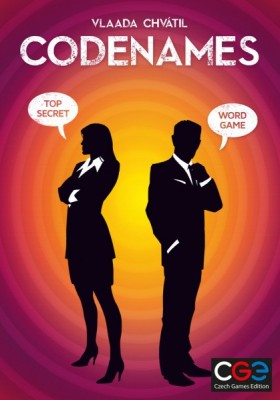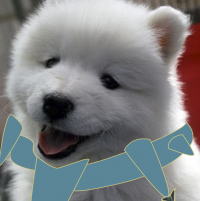I love me some Vlaada Chvatil. I delight in his imagination and skill in welding together unlikely elements to create brilliant games. He likes pushing dexterity into unlikely place. Or adding depth of strategy to genres and mechanics that have not, traditionally, had much. So it came as something of a surprise to find that his latest game, Codenames, is a simple party game.
Except, of course, this is Vlaada Chvatil. And that means appearances can be deceptive.
The little box is full of double-sided cards printed with single words. Lay twenty five of them out in a five by five grid and divide the players into two teams, each one of which has a spymaster. He knows which eight of those cards will score his team points if they can find them, but he can't just say which they are. Instead he can only give a one word clue. One word to bring them all. One word to bind them. One word to hopefully indicate as many cards as he can in one go.
It's easiest to explain with an example. In one game, where I was the spymaster, among the cards my team had to guess were "vet", "teacher", "agent", "spy" and "fireman". So I said "jobs, five", with the number indicating how many cards my clue pertains to. Otherwise, had my spies gone over and started guessing the wrong names they'd be handing points to the other team. Or, worse, picking out the hidden assassin card for an instant loss.
One word, five cards. Easy, right? Well, you'd think so. But I've given you a poor example in the interests of quickly illustrating what the game is about. Because the reality is that the game is often fiendishly hard. Fiendishly, brow-sweatingly, terrifyingly hard. In my experience finding a single word to tie two cards together is a tough ask. Three is a minor miracle. That five was a one-off, and we won.
What makes it all the more difficult is that if your team picks a word belonging to the opposing crew, you're hit with a double whammy. Your turn ends and the opposition gets a bonus point. So you must never, ever give a clue that might indicate one of their cards or, worse, the assassin. Easy enough in theory. In practice this is almost impossible.
Say you've got "apple", "sink" and "cook" down. Great, that's three food-related cards in one go. But there's also "oil" down there, tagged as an enemy agent. How on earth can you come up with something to link there first three without also risking your team picking the latter too?
These conundrums drive the game. It doesn't help that your team will instantly turn into dunderheads when you're the spymaster. Suddenly unable to pick up on even the easiest of your subtle lexical allusions. It can also be slow to try and think of the best clues. There's an egg timer in the box for good reason.
It's rare that you can really learn something from a game, let alone one this simple. Yet Codenames illustrates with dreadful ease the vast chasms that exist between the words we speak to one another. The huge gulfs of misunderstanding and confusion into which we often stumble at great cost to our relationships and our jobs. Playing Codenames will make you a better, clearer communicator. That's a great reason to play it.
Another great reason is that it has vast appeal across groups of gamers and non-gamers alike. That's because it relies on concepts of language that everyone understands, yet is a real struggle to play well, . It doesn't even have to be played competitively. With less than four players there's a co-op variant where you play against the clock, but it upscales to more players perfectly well. You can take it anywhere, play it with anyone, which is a brilliant trait in a party game likely to be owned by gaming geeks.
The one problem that you might find with it goes back to my original example. Remember how I said the four was a one-off? I got that because I was lucky enough to have four cards with a very clear association between them. When I've managed to get threes, it's been the same: down as much to luck and skill. So the difficulty level in the game is very unpredictable. That in itself wouldn't be an issue except, depending on how the cards fall, it might be that one team has a much easier grid of clues than the other.
It happens more often than you'd want. But on the other hand games only last about fifteen minutes so if you get a one-sided game you just flip the double-sided cards cards and try again. You'll want to, and so will all the other players too.
Who knows. Maybe it's just lack of skill that stops me from getting two cards to a clue without a lot of luck. Perhaps I'd better play another game to practice and find out. Perhaps I'd better play another ten.
 Games
Games How to resolve AdBlock issue?
How to resolve AdBlock issue? 



























